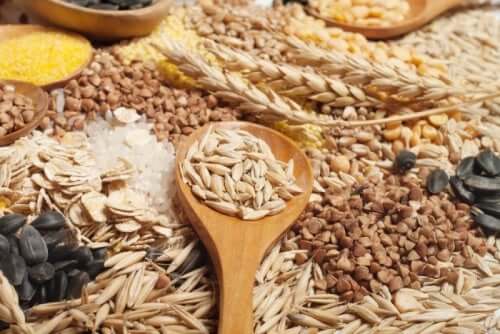Foods that Can Help Control Psoriasis

Psoriasis is a skin condition that affects approximately 2% of the entire population. The main symptom of this condition is irritated and reddened skin with whitish scales or plaques. In this article, we’ll take a look at how you can help control psoriasis symptoms with a healthy diet.
Changing your eating habits will not cure psoriasis. However, it can help decrease its symptoms.
Read on for some recommended foods that can help minimize psoriasis symptoms and some foods to avoid that can exacerbate them.
How to Control Psoriasis and its Relation with Food

In May 2017, a study published in Dermatologic Therapy analyzed the diet of more than 1,200 members of the National Psoriasis Foundation. The results revealed that some foods seem to intensify psoriasis, while others decrease symptoms.
In general, most of the people who participated in the study were on the following diet:
- Gluten-free,
- Low to no alcohol consumption,
- Increased consumption of vegetables and vitamin D.
At the same time, a large percentage of the participants claimed that they followed certain diets to control psoriasis with successful results. Overall, some of the most mentioned diets they claimed helped included the vegan diet, the Paleo diet, and the Mediterranean, vegetarian, gluten-free, and low-carbohydrate/high-protein diets.
Recommended Foods to Help Control Psoriasis
Below, we’ve included a list of foods based on the dietary recommendations published in the journal JAMA Dermatology.
1. Fruits and Vegetables

First of all, the following foods provide essential nutrients—like vitamin A, antioxidants, zinc, selenium, and magnesium—to your diet to control psoriasis.
Below are some fruits and vegetable that you should include in your daily diet:
- Carrots
- Bell pepper
- Pumpkin
- Spinach
- Broccoli
- Avocado
- Apricots
- Mango
- Raspberries
- Blueberries
- Blackberries
2. Omega-3 to control Psoriasis
Next, omega-3 fatty acids are known for their anti-inflammatory properties. Overall, these are great foods to include in anyone’s diet.
Some foods rich in these fatty acids include:
- Oily fish: salmon, sardines, herring, and mackerel
- Seafood
- Nuts and seeds
- Legumes like soybeans and chickpeas
Read more: Omega 3: More Foods Than Just Oily Fish
3. Whole-grain foods

Eating fiber and probiotics is extremely important. After all, if you want your body to absorb nutrients properly, you must maintain good intestinal health.
Therefore, we recommend eating whole-grain foods and eating fewer foods that are made with common flour. Whole-grain foods have higher fiber content and also are a great source of minerals.
Try adding rice, wheat, millet, oats, bread, and other similar whole-grains into your daily diet. In addition, you can also include kefir and yogurt into your diet to increase your consumption of probiotics.
4. Vitamin D can help control psoriasis
In addition, some studies show that including vitamin D can help control inflammatory illnesses like psoriasis.
That said, think about including foods like oily fish, egg, and sunflower seeds.
Food to Avoid to Control Psoriasis Symptoms
Before we start, it’s important to note that most of the foods listed below don’t need to be completely avoided. For some of the foods, it’s only recommended to lower your consumption or be more conscientious about your consumption of the foods listed below.
Let’s look at each food more in-depth.
1. Alcohol

There’s no conclusive data that supports completely avoiding alcohol for those who suffer from psoriasis.
However, some research does suggest that treatments for psoriasis are not as effective when combined with alcohol. Therefore, moderate consumption of alcohol is usually recommended.
If any of your medication contains methotrexate or acitretin, you should probably not drink any alcohol at all.
2. Processed foods and refined sugars
Psoriasis is an inflammatory disease. Therefore, to help control psoriasis, it’s recommended to eliminate processed foods that have low nutritional value, such as margarine, instant soup, soft drinks, and sauces.
3. Red meat
Specialists usually advise people with psoriasis to eat less red meat in their diet and to avoid fatty cuts of meat.
This is because these types of meat can increase the number of cytokines, which aggravates the symptoms of psoriasis.
4. Coffee and milk
Like red meat, these two drinks increase the number of cytokines, which are the cellular proteins that are responsible for regulating inflammation.
Therefore, it’s best to refrain from drinking coffee and milk regularly.
5. Can going gluten-free help control psoriasis?

Some studies suggest that a large part of the population that suffers from psoriasis may also be allergic to gluten. While some research suggests there is a correlation between the two, there are conflicting opinions within the scientific and medical field.
While some specialists like to eliminate gluten from the diet as a preventative step, some research supports that if the presence of celiac disease is not confirmed, this could be counterproductive.
Consult your doctor to discuss whether a gluten-free diet would benefit you.
6. Fats
A pro-inflammatory diet, or a diet that includes the regular consumption of saturated and trans fats, can exacerbate the symptoms of psoriasis. Therefore, a low consumption of fats is recommended.
Conclusions
Your diet cannot cure psoriasis. However, it can help alleviate its symptoms. Consult your doctor or nutritionist about the best dietary changes that can help you control this condition.
In conclusion, the changes in diet mentioned are guidelines for a balanced and varied diet. A balanced and varied diet can also be strengthened with physical exercise and healthy habits not only to control psoriasis symptoms but also to improve your overall health and quality of life.
All cited sources were thoroughly reviewed by our team to ensure their quality, reliability, currency, and validity. The bibliography of this article was considered reliable and of academic or scientific accuracy.
- Ford, A. R., Siegel, M., Bagel, J., Cordoro, K. M., Garg, A., Gottlieb, A., … Armstrong, A. W. (2018). Dietary Recommendations for Adults With Psoriasis or Psoriatic Arthritis From the Medical Board of the National Psoriasis Foundation: A Systematic Review Dietary Recommendations for Adults With Psoriasis or Psoriatic Arthritis Dietary Recommendations for A. JAMA Dermatology, 154(8), 934–950.
- Stella AB., Cappellari GG., Barazzoni R., Zanetti M., Update on the impact of omega 3 fatty acids on inflammation, insulin resistance and sarcopenia: a review. Int J Mol Sci, 2018.
- Valenzuela CA., Baker EJ., Miles EA., Calder PC., Eighteen carbon trans fatty acids and inflammation in the context of atherosclerosis. Prog Lipid Res, 2019.
This text is provided for informational purposes only and does not replace consultation with a professional. If in doubt, consult your specialist.








